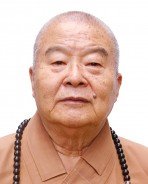
The Venerable Master Hsing Yun is a world-renowned religious leader, humanitarian, author and teacher.
He has never, however, enjoyed an easy or pampered life. He was born in 1927 to a very poor family in rural Jiangdu in Jiangsu Province in China. His father left home when he was still young and never returned. During his early years he was much influenced by his mother and grandmother, who were both pious and devoted Buddhists. On one occasion, whilst his mother was still vainly searching for her husband, she took Hsing Yun to Nanjing where, by chance, he met a monk who lived at the Qixia monastery. When the monk asked him whether he would like to live a monastic life, he readily agreed. He was twelve years of age. His life in the monastery was hard and he was continually penniless and often hungry. Looking back he says philosophically that poverty had the effect of stimulating wisdom and taught him that, no matter how adverse circumstances were, there was always a way to overcome problems and obstacles.
In 1941, having been fully ordained as a monk, Hsing Yun continued his formal training at Jiao-Shan Buddhist College. One day when reading he came across the word "nebula" - a bright burst of colour in the night sky caused by the creation or destruction of stars - which, in Chinese, is called "Xingyun". He admired the brightness and boundlessness of these nebulae and wished he could shed light and be as unbounded as the stars. This was why, some years later, he chose the dharma name of Hsing Yun.
At the age of twenty he left college and, in order to escape the turbulence of civil war, went to Taiwan where he began to teach and write about Buddhism. His first book, Singing in Silence, published in 1949, was to be the first of many and, in response to overwhelming popular demand, his stimulating writings have been translated into English, Japanese, German, French, Spanish, Korean, Thai and Portuguese. He has also founded several Buddhist publications, edited Buddhist periodicals and newsletters, written articles for major Taiwanese newspapers and scripts for radio. Indeed. his romantic novel National Master Yulin was later turned into a television soap opera The Continued Fate of Love.
In 1967 Master Hsing Yun purchased a large plot of land in Kaohsiung County on which the now famous Fo Guang Shan Monastery was built. Branches of this monastery were founded across the world in the United States of America, Australia, South Africa, Brazil, Japan, Thailand, Malaysia, France, the Netherlands, New Zealand, the United Kingdom and, of course, Hong Kong. He served three terms as abbot of Fo Guang Shan where he became renowned for his promotion of "Humanistic Buddhism", which focuses on the issues facing the world rather than on how to leave the world behind. Since then, for nearly half a century, he has devoted his efforts to transforming the world through the practice of humanistic Buddhism.
He has been credited by Buddhist scholars as one of the forefront leaders in the modern reformation of Buddhism by opening monasteries, universities and schools all around the world, as well as engaging in religious dialogue with other Buddhist sects and orders. He famously twice visited successive Popes in Rome to promote inter-religious exchange and pray for world peace.
In 1997 Master Hsing Yun decided to close the gates of Fo Guang Shan to the public, so that his followers could work and pray in a truly cloistered atmosphere but, in 2000, at the personal request of President Chan Shui Bian during a visit, the monastery was partially reopened a year later.
In 1992 Master Hsin Yun established the Buddha's Light International Association whose stated purpose was the globalisation of Buddhism. Significantly the Association's mission includes "promoting living Buddhism whilst being pragmatic in worldly affairs and compassionate in providing relief to the world".
Master Hsing Yun has indeed been pragmatic, openly involving himself in politics. He is well-known, for example, as a strong advocate of the "One China" policy.
He has also shown himself a man of profound compassion. He has organised massive relief activities in response to major natural disasters including the 1991 flood in East China, the 1999 Taiwan earthquake, the 2004 tsunami in South Asia and the 2008 Sichuan earthquake. He has also established hundreds of schools, hospitals, clinics, orphanages and charity projects in poverty-stricken communities around the world.
By way of recognition for his outstanding service to Buddhism and humanitarian causes Hsing Yun was in 1997 awarded the first grade medal for excellence from the Ministry of the Interior and the Ministry of Foreign Affairs in Taiwan and he has received honorary doctorates from many universities in countries and regimes as diverse as the United States of America, Taiwan, Chile, Thailand, Korea and Australia.
This University has benefited considerably from Master Hsing Yun's philosophy of outreach, in particular by his attending the opening ceremony of the Centre of Buddhist Studies library in 2003 and returning on a regular basis to share his wisdom through lectures and public talks.
Perhaps his outstanding contribution to humanity may be epitomised by one of the stated directions of his Association - "to emulate the spirit of the Buddha by being active and optimistic in dealing with life, thus giving others confidence, hope, joy and convenience".
He has, indeed, fulfilled his youthful ambition as a nebula shedding light for humanity.
Mr Chancellor, it is my honour and privilege to present to you the Venerable Master Hsing Yun for the degree of Doctor of Social Sciences honoris causa.
Citation written and delivered by Professor Michael Wilkinson, the Public Orator of the University.




